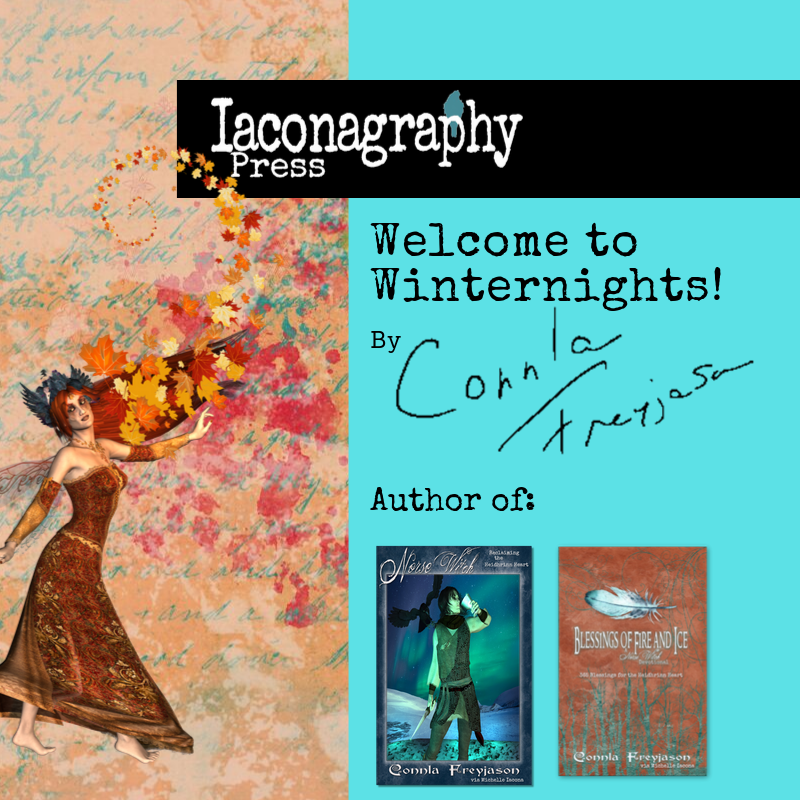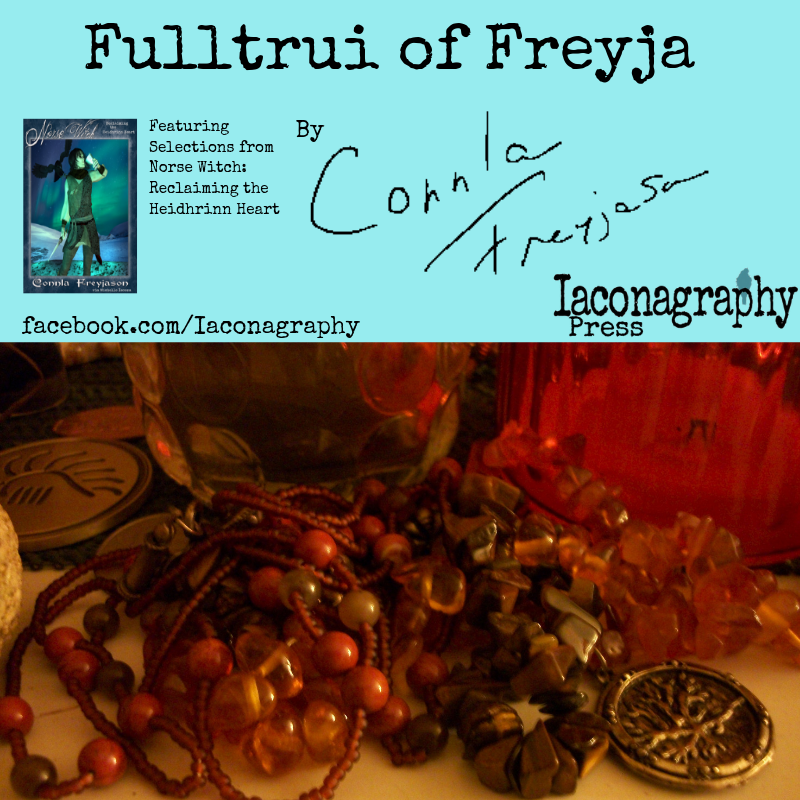Welcome to Winternights!

Tomorrow (September 19) marks the beginning of the festival period of Winternights, which lasts through September 27, at least as it is observed in my own private practice, and in the practice of Heidhrinn Sidhr. The Wheel of the Year that I present in my books and that I practice in my life is based as closely as possible on concrete historical evidence, drawn not only from Lore, but also the archaeological record, folkloric and ethnographic evidence. In the Lore itself, we find listed three requisite blot feasts:
“Þá skyldi blóta í móti vetri til árs, en at miðjum vetri blóta til gróðrar, hit þriðja at sumri, þat var sigrblót.”
“There should be a blot at the beginning of winter for a [good] year, and at mid-winter a blot for growth, the third at summer, that was Sigrblot [“victory blot”].”
—Ynglingatal, Connla Freyjason Translation
Here we have Winternights, Yule, and Sigrblot. We can deduce that the beginning of winter basically occurred in Uppland Sweden at a point near the Autumn Equinox (mid-September), giving us a date for the observance of Winternights. The themes celebrated at Winternights are largely drawn from the archaeological record and folkloric and ethnographic evidence. These themes include:
The second harvest (after which the fields would have been set ablaze; this also would have been the time of the first slaughter of livestock for the winter stores, and the primary hunting season, especially for geese)
The official beginning of Freyr’s journey into the Mound and up to Alfheim (following His “send-off” at Freyrfaxi)
Restoration, regaining, or first-gaining of Sovereignty (especially as this concept pertains to the tale of Idunna, as this is also the traditional time of the apple harvest)
Gratitude for the year just passed, and prayers and planning for the year-to-come.
Winternights marks the beginning of the season of going within: a prime time for sitting utiseta, and generally “getting your shit together”, whether mentally, psychically, physically, by balancing the soul-parts, or whatever needs doing. As such, it’s also a traditional time for Fall Cleaning (like Spring Cleaning, only, you know, in the Autumn).
When I think of Autumn, my mind and heart always travel back in time to those days when we would sit, as a family, around our fire pit outside by the wetlands. The sweet smell of burning wood would inundate our clothes, but the warmth was more than skin deep. As the last crickets of summer sang their hearts out, sometimes an owl might join their chorus, and we would tell each other stories of happy memories and times past. In that vein, to celebrate the beginning of one of our three largest festival seasons, I invite you now to imagine a fire crackling in the night (scroll down for a lovely crackling fire from Norway that I happily discovered on YouTube!), and I hope you will permit me to share a tale with you:
Peace and good seasons to you, and to yours, and to all those who have come before, and to all those who shall come after! The sun sets over the mounds, yet the Light climbs to Alfheim! Hail to Yngvi-Freyr, Who some of us here still call Grandfather!
This tale I shall tell you, you have not heard before, for it has not been told before. Parts of it, you may remember, and those parts best you know as true, but other parts I kenned as the moon turned new, fourteen nights ago:
You have heard it said: “Freyr received Alfheim as a tooth-gift”. And you have likewise heard it said: “Freyr is Lord under the mound”. I ken that both of these are true, and now I teach that kenning to all of you.
I sat—utiseta—through the long night, as the darkness inched towards day, a cat upon my lap, and my head bare. The earth was cold beneath my rump, and I could hear wolves crying in the south—crying up from the direction of where we now sit. And the wind rose, as though it were the ebb and flow of the ocean, and a bird called, and all of this in the middle of the night.
I looked up, and that bird came down, on the tree beside me. It was a woodpecker, one of the little kind. It took food from the side of the tree, and then it looked at me, and I knew it was our Lord, Freyr, and then it was Freyr, and He said to me:
“I have kept your bodies fed this summer-long, but now I must climb to Alfheim, to feed the better parts of you. I go underground, that I might climb the Winding Stair.”
And I asked Freyr, I asked:
“How is it that You do both: go underground, and at the same time climb?”
Freyr answered:
“You are only human, so I know this is hard for you to understand. You may only do one or the other—go below or reach above—yet I may do both at the same time. For I am not constrained by your human laws, though you be bound by Ours. Gods do not require things to be this or that; We may have both this and that. That is the way of things.”
And I asked Freyr, I asked:
“But why must you leave us the winter-long?”
Freyr answered:
“Climb with me the Winding Stair, and I will teach you these kennings that you seek.”
So I got up from there, and climbed the Stair, with Ingvi. And at the top, the glistening white halls of Salarsular, and I knew I stood in Alfheim. Then Freyr said:
“I leave you in winter that I might feed more than your bodies; that I might also feed your minds and hearts, for those are the better parts of Mankind. In winter, Skadhi’s snow is deep; you are forced inside, around your hearths, for warmth and safety. But as you go inside, you must also turn within. You climb the Stair, often without knowing it. Your bodies may be cold, in winter; it is important that your hearts and minds not grow cold as well. That is the peace that I climb to gift you in winter.”
And I asked Freyr, I asked:
“Teach me this peace of which You speak.”
Freyr answered:
“These are the things I shall teach you, Hundr Hjartasson: words to take back to your world:
Hospitality begins in the home. The hearth that is not warm with love can never spare a stranger. Instead, the loveless hearth may only serve to make that newcomer colder.
Charity, likewise, must begin in the home. If you cannot give to each other—to your own—how can you learn to give freely to others? Greed is bred by contempt of those we should be loving.
Gentleness is the mark of the valiant person. It takes more bravery by far to show mercy than to swing a sword.
Good seasons are measured by the richness of one’s heart, not one’s grave-goods! Live a rich life, while there is life to be lived. Richness of life does not always mean a bounteous life. No, it means a certain manner of fullness. That fullness is measured by how many times the smallest of things make you smile; by the warmth of arms wrapped round in embrace, whether by beloved or child. Every breath that is repaid with gratitude for its taking is a good season, and you would do well to be mindful of that.”
Then He showed me Gullinbursti, the Gleaming Boar:
“I have not gone at Yuletide; I am still there. I have not gone at Alfablot, and you mark that well enough. This is not the last and first, but the first and last. When you raise your horn in blot at Alfablot, remember it is not only I you honor, but my own people, as Visi-Alfar, and recall: I am not the only one! Remember it is not only your Ancestors-of-Kin whom you honor, but also those of Kith, and Path, and Milk. It is those who built the place in which you are living, and those who made a place for you in your world: the Landholders and Trailblazers. Honor all of them, and all of Us, and leave no one out! And when Yule comes, remember me again, when you raise your horn, and remember the light of this boar as you enjoy your feast: for it is my light that shines through this pig, and it is my light that must likewise shine through you: the light of peace and good seasons; the light of all that you have kenned here.”
And then He passed His hand over my eyes, and I felt as though I were falling, down and down and down, and back to earth. I closed them tight, for I knew Alfheim was high, and I feared my landing, but when I opened them again, I found myself just as I had been: out-sitting, a cat in my lap, my head bare.
Peace and good seasons to us,
And to those who come after,
And to all those whom we hold dear.


